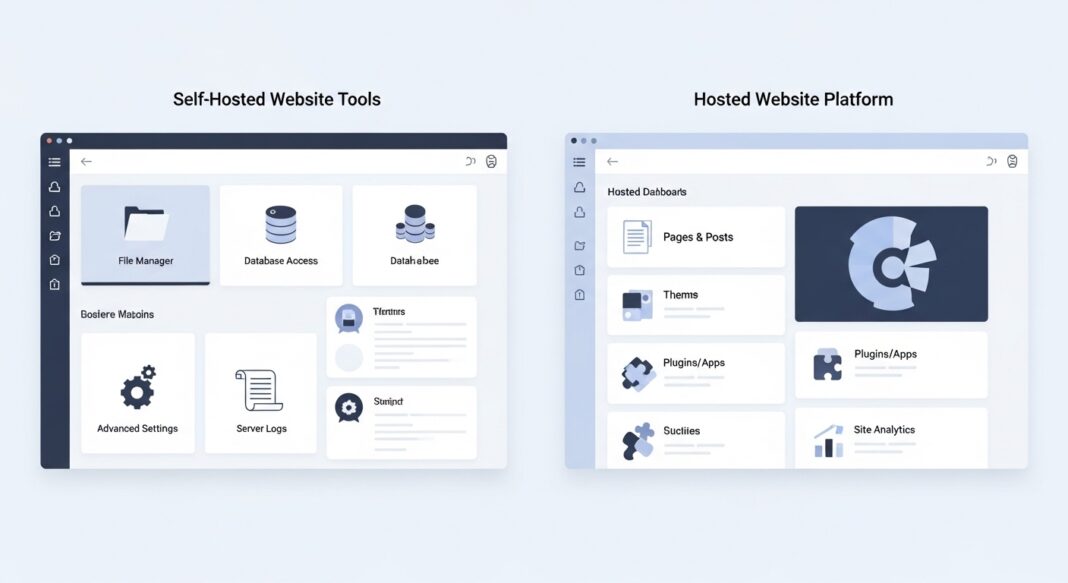When it comes to building a website, WordPress stands out as one of the most popular and versatile platforms. However, it’s essential to understand the fundamental distinction between WordPress.org vs WordPress.com. While they share the same name and originate from the same source, they cater to diverse needs and offer distinct functionalities.
WordPress.org
Self-Hosted Flexibility
WordPress.org provides the open-source software, which you can download and install on your web server. This self-hosted option grants you complete control over your website. You can modify the code, install plugins, and customize themes according to your preferences. This flexibility allows for unlimited customization, making it an ideal choice for developers, businesses, and individuals seeking complete autonomy over their site’s design and functionality.
Hosting and Domain Ownership
With WordPress.org, you’re responsible for acquiring your own web hosting and domain name. This means you have the freedom to choose the hosting provider that best fits your needs in terms of performance, security, and scalability. You have full ownership and control over your website’s data, making it easier to migrate to a different hosting service if necessary.
Customization and Plugins
One of the most significant advantages of WordPress.org is its extensive library of plugins and themes. There are thousands of free and premium options available, allowing you to enhance your website’s features and appearance without limitations. Whether you need SEO optimization, e-commerce functionality, or social media integration, there’s a plugin to meet almost every requirement.
Maintenance and Updates
Since you’re in charge of your WordPress.org site, you are responsible for its maintenance and updates. This includes regular backups, security measures, and staying up-to-date with software updates for both WordPress itself and the installed plugins and themes. While this level of control provides flexibility, it also requires technical knowledge or the assistance of web professionals to manage effectively.
WordPress.com
Hosted Platform Convenience
WordPress.com, on the other hand, is a hosted platform that offers an easier setup process. It provides hosting services, eliminating the need for users to manage their server. This convenience is particularly beneficial for beginners, bloggers, or individuals who prefer a hassle-free experience without dealing with technical aspects like hosting and server management.
Limited Customization
WordPress.com has limitations compared to WordPress.org in terms of customization. While it does offer a range of themes and some customization options, users have restricted access to modify the underlying code. Free plans come with limited themes and basic customization features, while higher-tier plans offer more flexibility but still within certain boundaries.
Hosting and Domain Integration
WordPress.com simplifies the process of obtaining a domain name by offering a free subdomain (e.g., yoursite.wordpress.com) for basic plans. Users can also purchase a custom domain through WordPress.com or connect their existing domain for a seamless integration experience. Hosting is included in the service, removing the need for users to handle hosting arrangements separately.
Maintenance and Updates
WordPress.com takes care of the core updates and backups for its users, relieving them of these responsibilities. This hands-off approach to maintenance is convenient, but it also means users have less control over the technical aspects of their website. Users cannot install custom plugins or themes outside the options provided by WordPress.com.
Conclusion
Choosing between WordPress.org vs WordPress.com depends on your specific needs and preferences. If you seek complete control, flexibility, and are willing to manage technical aspects, WordPress.org is the ideal choice. Conversely, if you prioritize convenience, ease of use, and are comfortable with limitations on customization, WordPress.com might be a better option.
Understanding these differences is crucial in making an informed decision about which WordPress platform aligns best with your website goals, technical expertise, and desired level of control. Whether you opt for the autonomy of WordPress.org or the simplicity of WordPress.com, both platforms offer powerful tools to create stunning and functional websites tailored to your needs.

